安徒生童话故事精选:老房子
小学三年级语文《总也倒不了的老屋》原文及教学反思

【导语】所谓教学反思,是指教师对教育教学实践的再认识、再思考,并以此来总结经验教训,进⼀步提⾼教育教学⽔平。
教学反思⼀直以来是教师提⾼个⼈业务⽔平的⼀种有效⼿段,教育上有成就的⼤家⼀直⾮常重视之。
以下是整理的⼩学三年级语⽂《总也倒不了的⽼屋》原⽂及教学反思相关资料,希望帮助到您。
【篇⼀】⼩学三年级语⽂《总也倒不了的⽼屋》原⽂ ⽼屋已经活了⼀百多岁了,它的窗户变成了⿊窟窿,门板也破了洞,很久很久没⼈住了。
“好了,我到了倒的时候了!”它⾃⾔⾃语着,准备往旁边倒去。
“等等,⽼屋!”⼀个⼩⼩的声⾳在它门前响起,“再过⼀个晚上,⾏吗?今天晚上有暴风⾬,我找不到⼀个安⼼睡觉的'地⽅。
” ⽼屋低下头,把⽼花的眼睛使劲往前凑:“哦,是⼩猫啊。
好吧,我就再站⼀个晚上。
” 第⼆天,天晴了,⼩猫从门上的破洞跳了出来:“喵喵,谢谢!” ⽼屋说:“再见!好了,我到了倒下的时候了!” “等等,⽼屋!”⼀个⼩⼩的声⾳在它门前响起,“再过⼆⼗⼀天,⾏吗?主⼈想拿⾛我的蛋,可是我想孵⼩鸡,我找不到⼀个安⼼孵蛋的地⽅。
” ⽼屋低头看看,墙壁吱吱呀呀响:“哦,是⽼母鸡啊。
好吧,我就再站⼆⼗⼀天。
” ⼆⼗⼀天后,⽼母鸡从破窗户⾥⾛了出来,九只⼩鸡从门板下⾯叽叽叫着钻了出来:“叽叽,谢谢!” ⽼屋说:“再见!好了,我到了倒下的时候了!” “等等,⽼屋!”⼀个⼩极了的声⾳在它门前响起,不注意根本听不到,“请再站⼀会⼉吧,我肚⼦好饿好饿,外⾯的树被砍光了,我找不到⼀个安⼼织抓⾍的地⽅。
” ⽼屋低头看看,眼睛眯成⼀条缝:“哦,是⼩蜘蛛啊。
好吧,我就再站⼀会⼉。
” ⼩蜘蛛飞快地爬进屋⼦,在屋檐上织了⼀张⼜⼤⼜漂亮的。
偶尔有⾍⼦撞到了上,⼩蜘蛛马上爬过去把⾍⼦吃掉。
“⼩蜘蛛,你吃饱了吗?”⽼屋问。
“没有,没有。
”⼩蜘蛛⼀边忙着补,⼀边回答,“⽼屋⽼屋,我给你讲个故事吧!” ⽼屋想,这倒很有意思。
于是它就开始听⼩蜘蛛讲故事。
⼩蜘蛛的故事⼀直没讲完,因此,⽼屋到现在还站在那⼉,边晒太阳,边听⼩蜘蛛讲故事。
绘本故事-女巫和老房子
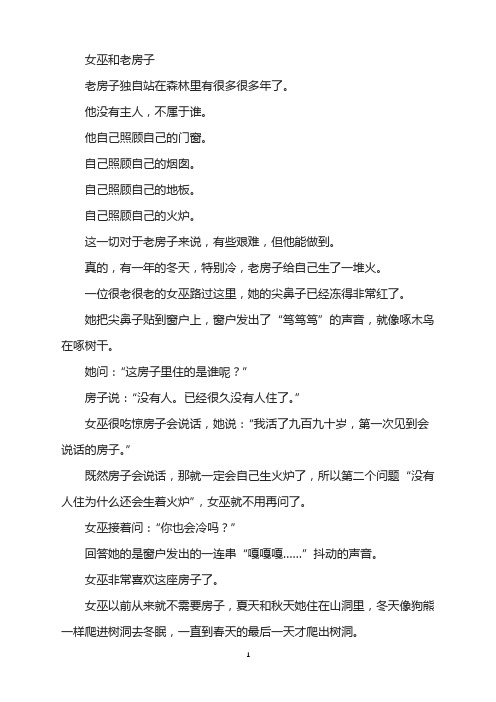
女巫和老房子
老房子独自站在森林里有很多很多年了。
他没有主人,不属于谁。
他自己照顾自己的门窗。
自己照顾自己的烟囱。
自己照顾自己的地板。
自己照顾自己的火炉。
这一切对于老房子来说,有些艰难,但他能做到。
真的,有一年的冬天,特别冷,老房子给自己生了一堆火。
一位很老很老的女巫路过这里,她的尖鼻子已经冻得非常红了。
她把尖鼻子贴到窗户上,窗户发出了“笃笃笃”的声音,就像啄木鸟在啄树干。
她问:“这房子里住的是谁呢?”
房子说:“没有人。
已经很久没有人住了。
”
女巫很吃惊房子会说话,她说:“我活了九百九十岁,第一次见到会说话的房子。
”
既然房子会说话,那就一定会自己生火炉了,所以第二个问题“没有人住为什么还会生着火炉”,女巫就不用再问了。
女巫接着问:“你也会冷吗?”
回答她的是窗户发出的一连串“嘎嘎嘎……”抖动的声音。
女巫非常喜欢这座房子了。
女巫以前从来就不需要房子,夏天和秋天她住在山洞里,冬天像狗熊一样爬进树洞去冬眠,一直到春天的最后一天才爬出树洞。
“我喜欢你。
”女巫对老房子说,“我想做你的伙伴。
”
老房子非常愿意。
真的非常愿意,因为女巫只是说做他的伙伴,而没有说做他的主人。
老房子再不会独自站在森林里了。
他不用自己照顾自己的门窗。
不用自己照顾自己的烟囱。
不用自己照顾自己的地板。
更加不用自己照顾火炉。
这一切都不用老房子独自操心了。
对于他的朋友女巫来说,做这些事简直是太容易了。
老房子详细版-安徒生童话
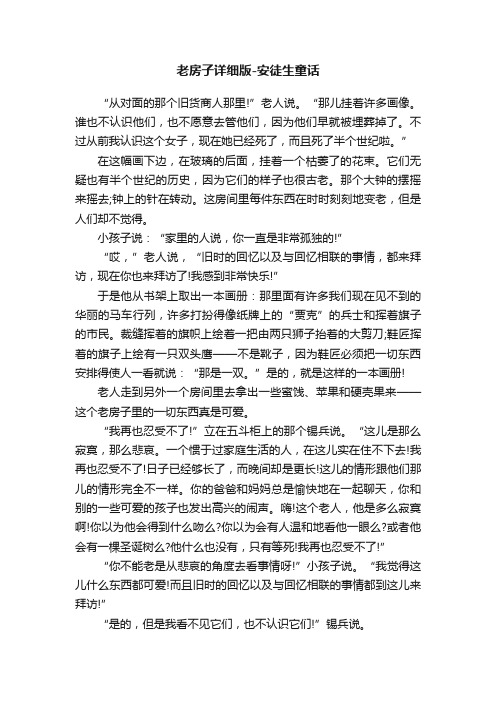
老房子详细版-安徒生童话“从对面的那个旧货商人那里!”老人说。
“那儿挂着许多画像。
谁也不认识他们,也不愿意去管他们,因为他们早就被埋葬掉了。
不过从前我认识这个女子,现在她已经死了,而且死了半个世纪啦。
”在这幅画下边,在玻璃的后面,挂着一个枯萎了的花束。
它们无疑也有半个世纪的历史,因为它们的样子也很古老。
那个大钟的摆摇来摇去;钟上的针在转动。
这房间里每件东西在时时刻刻地变老,但是人们却不觉得。
小孩子说:“家里的人说,你一直是非常孤独的!”“哎,”老人说,“旧时的回忆以及与回忆相联的事情,都来拜访,现在你也来拜访了!我感到非常快乐!”于是他从书架上取出一本画册:那里面有许多我们现在见不到的华丽的马车行列,许多打扮得像纸牌上的“贾克”的兵士和挥着旗子的市民。
裁缝挥着的旗帜上绘着一把由两只狮子抬着的大剪刀;鞋匠挥着的旗子上绘有一只双头鹰——不是靴子,因为鞋匠必须把一切东西安排得使人一看就说:“那是一双。
”是的,就是这样的一本画册!老人走到另外一个房间里去拿出一些蜜饯、苹果和硬壳果来——这个老房子里的一切东西真是可爱。
“我再也忍受不了!”立在五斗柜上的那个锡兵说。
“这儿是那么寂寞,那么悲哀。
一个惯于过家庭生活的人,在这儿实在住不下去!我再也忍受不了!日子已经够长了,而晚间却是更长!这儿的情形跟他们那儿的情形完全不一样。
你的爸爸和妈妈总是愉快地在一起聊天,你和别的一些可爱的孩子也发出高兴的闹声。
嗨!这个老人,他是多么寂寞啊!你以为他会得到什么吻么?你以为会有人温和地看他一眼么?或者他会有一棵圣诞树么?他什么也没有,只有等死!我再也忍受不了!”“你不能老是从悲哀的角度去看事情呀!”小孩子说。
“我觉得这儿什么东西都可爱!而且旧时的回忆以及与回忆相联的事情都到这儿来拜访!”“是的,但是我看不见它们,也不认识它们!”锡兵说。
“我再也忍受不了!”“你要忍受下去。
”小孩子说。
这时老人带着一副最愉快的面孔和最甜美的蜜饯、苹果以及硬壳果走来了。
安徒生童话故事:藏着并不等于遗忘
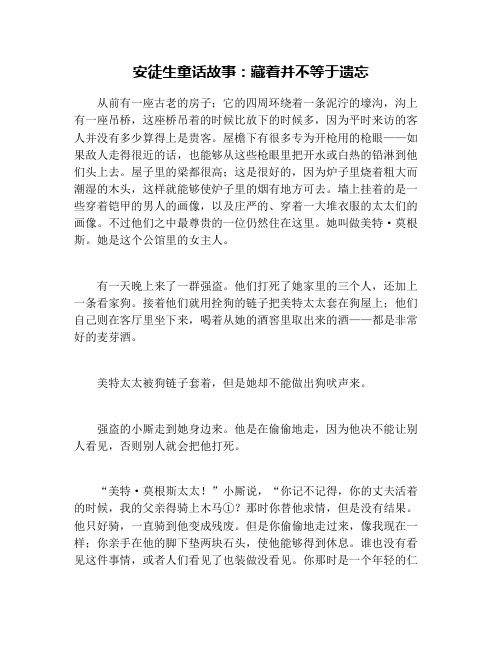
安徒生童话故事:藏着并不等于遗忘从前有一座古老的房子;它的四周环绕着一条泥泞的壕沟,沟上有一座吊桥,这座桥吊着的时候比放下的时候多,因为平时来访的客人并没有多少算得上是贵客。
屋檐下有很多专为开枪用的枪眼——如果敌人走得很近的话,也能够从这些枪眼里把开水或白热的铅淋到他们头上去。
屋子里的梁都很高;这是很好的,因为炉子里烧着粗大而潮湿的木头,这样就能够使炉子里的烟有地方可去。
墙上挂着的是一些穿着铠甲的男人的画像,以及庄严的、穿着一大堆衣服的太太们的画像。
不过他们之中最尊贵的一位仍然住在这里。
她叫做美特·莫根斯。
她是这个公馆里的女主人。
有一天晚上来了一群强盗。
他们打死了她家里的三个人,还加上一条看家狗。
接着他们就用拴狗的链子把美特太太套在狗屋上;他们自己则在客厅里坐下来,喝着从她的酒窖里取出来的酒——都是非常好的麦芽酒。
美特太太被狗链子套着,但是她却不能做出狗吠声来。
强盗的小厮走到她身边来。
他是在偷偷地走,因为他决不能让别人看见,否则别人就会把他打死。
“美特·莫根斯太太!”小厮说,“你记不记得,你的丈夫活着的时候,我的父亲得骑上木马①?那时你替他求情,但是没有结果。
他只好骑,一直骑到他变成残废。
但是你偷偷地走过来,像我现在一样;你亲手在他的脚下垫两块石头,使他能够得到休息。
谁也没有看见这件事情,或者人们看见了也装做没看见。
你那时是一个年轻的仁慈的太太。
这件事情是我的父亲告诉我的。
我没有对任何人说过,但是我并没有忘记!美特·莫根斯太太,现在我要释放你!”①骑木马(Traehest)是古时的一种刑罚。
犯人被绑在一个木凳子上,脚不落地,非常痛苦。
他们两人从马厩里牵出马来,在风雨中骑走了,并且得到了人们善意的协助。
“我为那个老人帮的一点小忙,现在所得到的报酬倒是很多!”美特·莫根斯说。
“不说并不等于忘记!”小厮说。
强盗们后来都得到了绞刑的处罚。
另外还有一幢老房子;它现在仍然存有。
老房子故事短篇100字左右
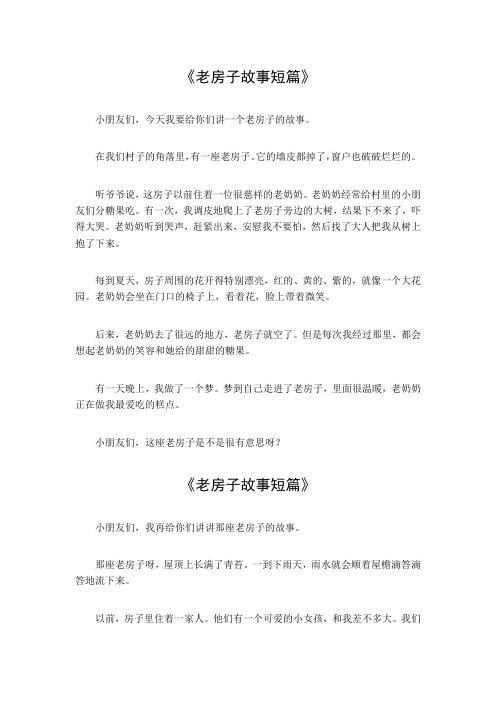
《老房子故事短篇》小朋友们,今天我要给你们讲一个老房子的故事。
在我们村子的角落里,有一座老房子。
它的墙皮都掉了,窗户也破破烂烂的。
听爷爷说,这房子以前住着一位很慈祥的老奶奶。
老奶奶经常给村里的小朋友们分糖果吃。
有一次,我调皮地爬上了老房子旁边的大树,结果下不来了,吓得大哭。
老奶奶听到哭声,赶紧出来,安慰我不要怕,然后找了大人把我从树上抱了下来。
每到夏天,房子周围的花开得特别漂亮,红的、黄的、紫的,就像一个大花园。
老奶奶会坐在门口的椅子上,看着花,脸上带着微笑。
后来,老奶奶去了很远的地方,老房子就空了。
但是每次我经过那里,都会想起老奶奶的笑容和她给的甜甜的糖果。
有一天晚上,我做了一个梦。
梦到自己走进了老房子,里面很温暖,老奶奶正在做我最爱吃的糕点。
小朋友们,这座老房子是不是很有意思呀?《老房子故事短篇》小朋友们,我再给你们讲讲那座老房子的故事。
那座老房子呀,屋顶上长满了青苔。
一到下雨天,雨水就会顺着屋檐滴答滴答地流下来。
以前,房子里住着一家人。
他们有一个可爱的小女孩,和我差不多大。
我们经常一起在房子后面的小山坡上玩耍。
有一次,我们在山坡上发现了一个鸟窝,里面有几颗小小的鸟蛋。
我们小心翼翼地看着,生怕把鸟蛋弄坏了。
房子前面有一棵大大的柳树,夏天的时候,我们就在柳树下乘凉。
大人们会在那里聊天,我们就围着柳树跑来跑去。
可是后来,那家人搬走了,老房子变得冷冷清清的。
有时候我经过那里,还会想起和小女孩一起玩耍的快乐时光。
有一次,我一个人来到老房子前,风呼呼地吹着,窗户发出嘎吱嘎吱的声音,好像在和我说话。
小朋友们,你们喜欢这个故事吗?《老房子故事短篇》小朋友们,我还有老房子的故事要说给你们听。
这座老房子的门是木头做的,上面有好多划痕。
听爸爸讲,他小时候经常在这房子里捉迷藏。
有一次,他藏在了一个大柜子里,大家找了好久都没找到。
等他自己从柜子里出来的时候,天都黑了。
房子后面有一个小池塘,水很清。
夏天的时候,会有很多青蛙在那里唱歌。
读安徒生童话老房子有感作文
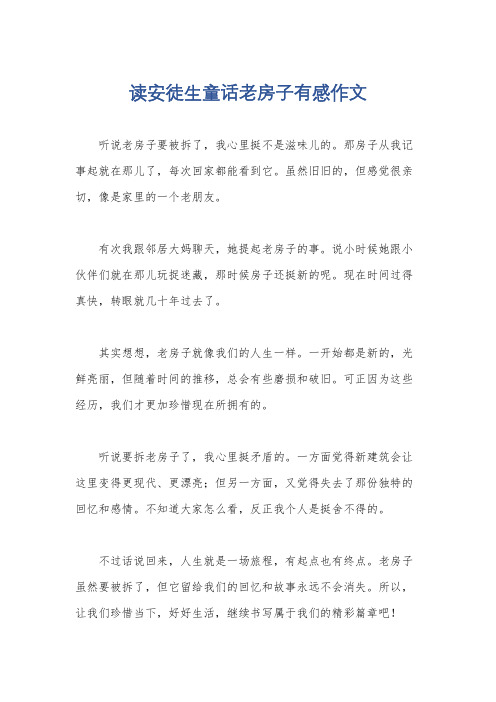
读安徒生童话老房子有感作文
听说老房子要被拆了,我心里挺不是滋味儿的。
那房子从我记事起就在那儿了,每次回家都能看到它。
虽然旧旧的,但感觉很亲切,像是家里的一个老朋友。
有次我跟邻居大妈聊天,她提起老房子的事。
说小时候她跟小伙伴们就在那儿玩捉迷藏,那时候房子还挺新的呢。
现在时间过得真快,转眼就几十年过去了。
其实想想,老房子就像我们的人生一样。
一开始都是新的,光鲜亮丽,但随着时间的推移,总会有些磨损和破旧。
可正因为这些经历,我们才更加珍惜现在所拥有的。
听说要拆老房子了,我心里挺矛盾的。
一方面觉得新建筑会让这里变得更现代、更漂亮;但另一方面,又觉得失去了那份独特的回忆和感情。
不知道大家怎么看,反正我个人是挺舍不得的。
不过话说回来,人生就是一场旅程,有起点也有终点。
老房子虽然要被拆了,但它留给我们的回忆和故事永远不会消失。
所以,让我们珍惜当下,好好生活,继续书写属于我们的精彩篇章吧!。
安徒生童话故事第46篇:老房子TheOldHouse

安徒生童话故事第46篇:老房子TheOldHouse安徒生童话故事第46篇:老房子The Old House一幢漂亮的新房子建立起来了;它有宽大的窗子和平整的白墙。
不过那座老房子原来所在的地方恰恰成了一个小花园。
邻近的墙上长满了野生的葡萄藤。
花园前面有一道铁栏杆和一个铁门。
它们的样子很庄严。
行人在它们面前停下步子,朝里面望。
麻雀成群地栖在葡萄藤上,叽叽喳喳地互相叫着。
不过它们不是谈着关于那幢老房子的事情,因为它们记不清那些事。
许多年已经过去了,那个小孩子已经长大成人,长成了一个像他父母所期望的有能力的人。
他刚结婚不久。
他要同他的妻子搬进这幢有小花园的房子里来。
当她正在栽一棵她认为很美丽的野花的时候,他站在她的身边。
她用小巧的手栽着花,用指头在花周围紧按上些泥土。
“噢!这是什么?”她觉得有件什么东西刺着了她。
有一件尖东西在柔软的泥土里冒出来了。
想想看吧!这就是那个锡兵——在那个老人房间里跑掉的锡兵。
他曾经在烂木头和垃圾里混了很久,最后又在土里睡了许多年。
年轻的妻子先用一片绿叶子、然后又用她美丽的、喷香的手帕把锡兵擦干净。
锡兵好像是从昏睡中恢复了知觉。
“让我瞧瞧他吧!”年轻人说。
于是他笑起来,摇着头。
“啊!这不可能就是他,但是他使我记起了我小时候跟一个锡兵的一段故事!”于是他就对他的妻子讲了关于那座老房子、那个老人和锡兵的故事。
他把锡兵送给了老人,因为他是那么孤独。
他讲得那么仔细,好像是真事一样。
年轻的妻子不禁为那座老房子和那个老人流出泪来。
“这也许就是那个锡兵!”她说。
“让我把他保存起来,以便记住你所告诉我的这些事情。
但是你得把那个老人的坟指给我看!”“我不知道它在什么地方呀,”他说,“谁也不知道它!他所有的朋友都死了;没有谁去照料它,而我自己那时还不过是一个小孩了!”“那么他一定是一个非常孤独的人了!”她说。
“是的,可怕地孤独!”锡兵说,“不过他居然没有被人忘记掉,倒也真使人高兴!”“高兴!”旁边一个声音喊。
安徒生童话故事大全篇_经典童话故事
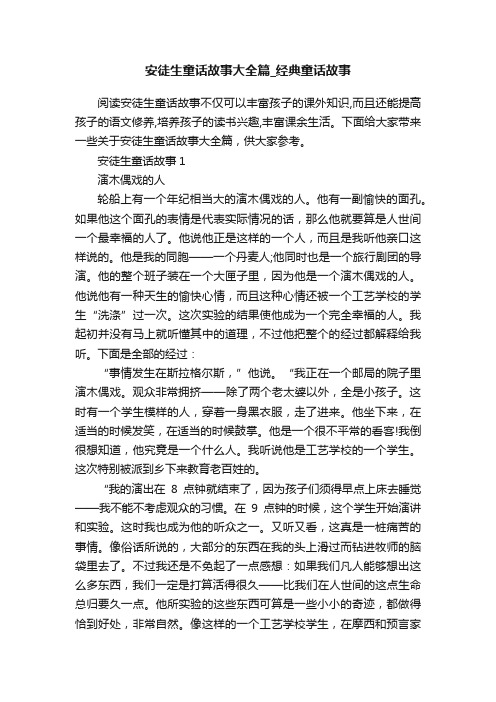
安徒生童话故事大全篇_经典童话故事阅读安徒生童话故事不仅可以丰富孩子的课外知识,而且还能提高孩子的语文修养,培养孩子的读书兴趣,丰富课余生活。
下面给大家带来一些关于安徒生童话故事大全篇,供大家参考。
安徒生童话故事1演木偶戏的人轮船上有一个年纪相当大的演木偶戏的人。
他有一副愉快的面孔。
如果他这个面孔的表情是代表实际情况的话,那么他就要算是人世间一个最幸福的人了。
他说他正是这样的一个人,而且是我听他亲口这样说的。
他是我的同胞——一个丹麦人;他同时也是一个旅行剧团的导演。
他的整个班子装在一个大匣子里,因为他是一个演木偶戏的人。
他说他有一种天生的愉快心情,而且这种心情还被一个工艺学校的学生“洗涤”过一次。
这次实验的结果使他成为一个完全幸福的人。
我起初并没有马上就听懂其中的道理,不过他把整个的经过都解释给我听。
下面是全部的经过:“事情发生在斯拉格尔斯,”他说。
“我正在一个邮局的院子里演木偶戏。
观众非常拥挤——除了两个老太婆以外,全是小孩子。
这时有一个学生模样的人,穿着一身黑衣服,走了进来。
他坐下来,在适当的时候发笑,在适当的时候鼓掌。
他是一个很不平常的看客!我倒很想知道,他究竟是一个什么人。
我听说他是工艺学校的一个学生。
这次特别被派到乡下来教育老百姓的。
“我的演出在8点钟就结束了,因为孩子们须得早点上床去睡觉——我不能不考虑观众的习惯。
在9点钟的时候,这个学生开始演讲和实验。
这时我也成为他的听众之一。
又听又看,这真是一桩痛苦的事情。
像俗话所说的,大部分的东西在我的头上滑过而钻进牧师的脑袋里去了。
不过我还是不免起了一点感想:如果我们凡人能够想出这么多东西,我们一定是打算活得很久——比我们在人世间的这点生命总归要久一点。
他所实验的这些东西可算是一些小小的奇迹,都做得恰到好处,非常自然。
像这样的一个工艺学校学生,在摩西和预言家的时代,一定可以成为国家的一个圣人①;但是假如在中世纪,他无疑地会被烧死②。
①摩西和预言家都是督教《圣经·旧约》里的人物,生活在大约纪元前1200年间。
《老房子》读书笔记

《老房子》读书笔记清晨,几声清脆的鸟叫声把我从梦境中拉回。
我掀开窗帘,几缕阳光投向窗檐,洒落在大地上,把棕色的地面染成蜜黄色的。
晨曦中,我又一次打开世界插图大师英诺森提的作品《房子》,听那座老房子讲述它的故事。
老房子讲述了一座房子的岁月变迁,实际也是人类发展的缩影,在固定的空间背景下叙述了时间的流逝,展现了几代人的生活。
听,老房子开始缓缓讲它的故事了:我的门楣上写着1656年的字样,这一年发生了大鼠疫,我就在这时被造出来的。
我是用石头和木头盖起来的,不过,随着日子一天天过去,我的窗子慢慢地能看见东西了,我的屋檐也能听见声音了读到这里,我不禁问自己:这座老房子到底看见了什么又听见了什么它或许看到绵延的青山,潺潺的溪流和缕缕缥缈的炊烟;它或许听到了淅淅沥沥的雨声,或许听到了妇女哼唱的眠歌和风吹树叶的沙沙声老房子是讲故事的高手,漫漫的三百多年,挑出了十五年就叙述了整整一个世纪的故事。
每一年的故事都配有一幅大大的图画和几行意味深长的诗歌,如同一首首恒远的歌谣:1900年,老房子唱到大风呼呼刮,我听见有人喊,看那!有个会讲故事的老房子顶呱呱。
我不再孤单无助,没人搭理,孩子们最终发现我,解开我的迷。
就在这一个清晨,老房子被赋予一种新生命,它的故事就是从1900年讲起的,我想这应该包含着老房子对孩子们的感激之情。
1905年,这个世纪刚五岁,是个小毛头,在葡萄藤中长大,让新芽冒尖。
这小小王朝的建造者们全都把家中壮实的树木精心地照看。
打开这一页,映入眼帘的是一片生机盎然的山林,麦田已经泛青,山坡上刚栽下的树苗也摇曳着绿绿的嫩叶,菜地里的青菜和豆荚长势喜人,一群山羊悠闲地穿梭在山林间。
几匹牛马拉着车,上面坐着孩子和父亲,几位妇女站在门口,向他们招手告别。
1967年,现在我裹入告别时的细雨阵阵,寡妇的离世便是我葬礼的时辰。
房子少了一颗心,如同花儿上缺少了露珠,钟声轻轻地敲响。
原来,人就是老房子的心,人的离去使老房子缺少了心,缺少了灵魂和生机。
《老房子》阅读练习(附答案)

《老房子》阅读练习(附答案)导语:练习可以帮助同学们温习、巩固所学知识,提高语文学习水平。
下面是《老房子》阅读练习(附答案),欢迎同学们过来练习。
阅读《老房子》选段,完成1~4题。
老房子在徽州随处可见,每一幢房子都是一段遥远的故事。
八十年代初,在皖南的紫霞峰下,筹建了一处“明代民居博物馆”,号称“潜口民庄”。
庄内采用原拆原建的办法,将散落在徽州各地的十幢老房子集中于此,形成了独具特色的明代山庄。
主要建筑内部陈设有明代家具和其他生活用品,力图再现几个世纪以前徽州人的生活方式。
尽管曾多次参观此处山庄,但平心而论,我从未激起过太多的兴趣,这倒不完全是因为山庄崭新雪白的外墙缺乏一种历史感。
说真的,我宁愿在荒烟蔓草的村僻之地看到一幢幢孤零零的老房子,尽管有时显得十分残破,残破得让人惨目伤心,但那种独特的风致却是任何人为集成的山庄所无法比拟的。
然而,我也清楚地意识到,对于老房子,人们总是交集着种种复杂的情感。
许多老房子在乡间之所以一直保留到现在,往往不是因为房屋的主人真的能从审美的愉悦中得到心理的满足,而是由于它们曾一度远离现代生活的尘嚣。
如今,随着时光的流逝,乡土文化的日渐逸散,点缀于村野间的老房子,或是倒塌,或是被拆得七零八落。
于是,在屯溪老街,在西递巷口……处处都能看到从老房子上拆下的精美部件:雀替,窗棂,雕花栏板,等等等等。
…………记得数年前第一次踏上徽州这块土地,但见烟树葱茏,掩映着栉比而立的黛瓦粉墙,将徽州民居衬托在山光水色之中,呈现出一派清新野逸的田园风光。
犹如丹青妙笔在用枯笔淡墨,勾勒出疏树寒村的山水胜境。
那种“柳暗花明又一村”的牵人情思,强烈地吸引着我深入画境,寻幽探胜而陶然忘返。
此后,我又多次走访徽州,看到了历史与现实的诸多侧面,激情与冲动,渐次转化作平静的思考。
“徽式新屋”曾是一种非常时髦的民居型式,在徽州高移民输出的特殊时代里风靡一时。
然而,一旦时过境迁,徽派老房子便愈来愈显现出它的弱点。
安徒生童话故事老房子的读后感

安徒生童话故事老房子的读后感引言老房子,如同一个破旧童话,蕴含着青春年华的回忆和无尽的故事。
安徒生童话中的老房子就是这样的一个魅力所在,它见证了人们的成长与变迁,承载了无尽的情感和记忆。
读完安徒生童话中的老房子故事后,我深深被其所打动,感受到了生命的力量和人性的美好。
童话故事-老房子故事里的老房子位于一个小镇的角落,它曾经是一家人的家园。
然而,随着时间的流逝,老房子逐渐衰败,被人们忘记。
直到有一天,一个小姑娘渴望拥有一个属于自己的家,她选择了这个被遗弃的老房子。
小姑娘带着梦想和希望,为老房子注入了新的生机。
她修缮房子,打扫庭院,给它重新粉刷了一番。
老房子渐渐恢复了昔日的光彩,成为了一个令人向往的家。
小姑娘与老房子之间建立了深厚的情感,她与房子一同成长,一同经历了欢笑和泪水。
故事的深意安徒生童话中的老房子故事,不仅仅是一段温暖感人的故事,更蕴含着许多深刻的道理。
首先,它告诉我们,无论多么寂寞和破败,每个事物都有自己的价值和美丽。
老房子经历了岁月的洗礼,虽然不再年轻,但它仍然有它独特的韵味和故事。
其次,故事传递了一个重要的信息,即勇敢去追求自己的梦想。
小姑娘选择了被人们遗忘的老房子作为自己的家,她没有因为它的破旧而感到畏惧,相反,她在努力中发现了它的美好,并将其还原成一个完整的家。
这给我们带来了启示,即不论外界如何评价,只要我们拥有坚定的信念和勇气,就能够创造属于自己的幸福和快乐。
同时,故事也让我们思考生活的意义和价值。
虽然老房子只是一个简单的建筑物,但它见证了家庭的温暖和人们的情感。
在现代快节奏的社会中,我们常常追求物质的满足,而忽视了情感和人性的需求。
老房子故事提醒我们要关注身边的人和事,用心去感受生活的美好。
结语通过《老房子》这个童话故事,安徒生以其独特的笔调和生动的描写,将读者带入了一个感人而温馨的世界。
故事中的老房子成为了一个象征,象征着希望、勇气和生命力。
在这个破旧的建筑中,我们感受到了人性的善良和美好,以及努力与坚持的力量。
安徒生童话故事之《各得其所》
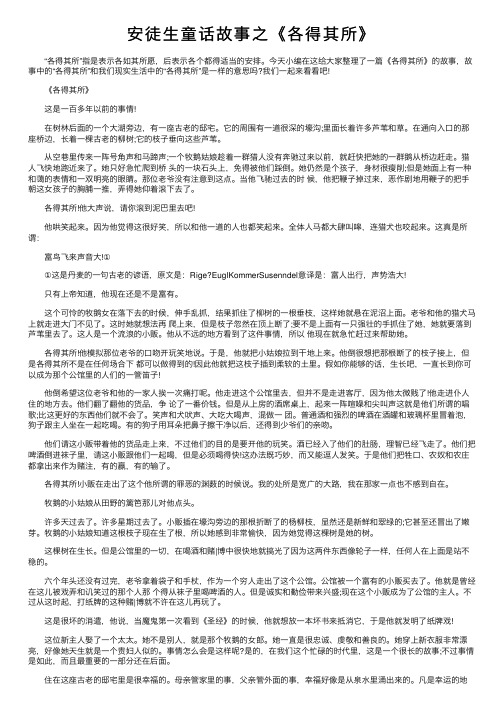
安徒⽣童话故事之《各得其所》 “各得其所”指是表⽰各如其所愿,后表⽰各个都得适当的安排。
今天⼩编在这给⼤家整理了⼀篇《各得其所》的故事,故事中的“各得其所”和我们现实⽣活中的“各得其所”是⼀样的意思吗?我们⼀起来看看吧! 《各得其所》 这是⼀百多年以前的事情! 在树林后⾯的⼀个⼤湖旁边,有⼀座古⽼的邸宅。
它的周围有⼀道很深的壕沟;⾥⾯长着许多芦苇和草。
在通向⼊⼝的那座桥边,长着⼀棵古⽼的柳树;它的枝⼦垂向这些芦苇。
从空巷⾥传来⼀阵号⾓声和马蹄声;⼀个牧鹅姑娘趁着⼀群猎⼈没有奔驰过来以前,就赶快把她的⼀群鹅从桥边赶⾛。
猎⼈飞快地跑近来了。
她只好急忙爬到桥头的⼀块⽯头上,免得被他们踩倒。
她仍然是个孩⼦,⾝材很瘦削;但是她⾯上有⼀种和蔼的表情和⼀双明亮的眼睛。
那位⽼爷没有注意到这点。
当他飞驰过去的时候,他把鞭⼦掉过来,恶作剧地⽤鞭⼦的把⼿朝这⼥孩⼦的胸脯⼀推,弄得她仰着滚下去了。
各得其所!他⼤声说,请你滚到泥巴⾥去吧! 他哄笑起来。
因为他觉得这很好笑,所以和他⼀道的⼈也都笑起来。
全体⼈马都⼤肆叫嗥,连猎⽝也咬起来。
这真是所谓: 富鸟飞来声⾳⼤!① ①这是丹麦的⼀句古⽼的谚语,原⽂是:Rige?EuglKommerSusenndel意译是:富⼈出⾏,声势浩⼤! 只有上帝知道,他现在还是不是富有。
这个可怜的牧鹅⼥在落下去的时候,伸⼿乱抓,结果抓住了柳树的⼀根垂枝,这样她就悬在泥沼上⾯。
⽼爷和他的猎⽝马上就⾛进⼤门不见了。
这时她就想法再爬上来,但是枝⼦忽然在顶上断了;要不是上⾯有⼀只强壮的⼿抓住了她,她就要落到芦苇⾥去了。
这⼈是⼀个流浪的⼩贩。
他从不远的地⽅看到了这件事情,所以他现在就急忙赶过来帮助她。
各得其所!他模拟那位⽼爷的⼝吻开玩笑地说。
于是,他就把⼩姑娘拉到⼲地上来。
他倒很想把那根断了的枝⼦接上,但是各得其所不是在任何场合下都可以做得到的!因此他就把这枝⼦插到柔软的⼟⾥。
假如你能够的话,⽣长吧,⼀直长到你可以成为那个公馆⾥的⼈们的⼀管笛⼦! 他倒希望这位⽼爷和他的⼀家⼈挨⼀次痛打呢。
安徒生童话故事(15篇)

安徒生童话故事安徒生童话故事(15篇)一天我协助哈里发迈蒙处理一些国家大事后,便告辞回家。
走在途中,我想小便,看看四周没什么行人,便拐进一条小巷里撒尿。
我刚要回身继续往家里走,猛然间发现前面隐隐约约有一件东西悬在那里。
这情景引起了我的好奇心,我不由自主地走到近前一看,原来那是一个有四个把儿的大吊篮,篮中铺着锦缎制的垫子。
我顺着吊篮往上看,才知那是从一个敞开的大窗户里吊下来的。
我心里暗自琢磨:"这只大吊篮是不会平白无故从窗里吊到这里的,这其中必定是有缘故的。
"我越想越奇怪,这个大吊篮大得很,能容一个人躺在里面,我倒想试试,躺到里面会是个什么滋味?受到好奇心的驱使,我竟身不由己地爬进吊篮,嘿,躺在里面还真舒服!不料,我刚躺好,那吊篮就动了起来,我想跳出来,已经来不及了。
吊篮不停地往上升,一直升到窗口,几只手伸过来,一下子把吊篮弄到屋子里去了。
我在慌乱中抬头一看,只见四张美丽的脸蛋冲着我,连声喊着:"你好啊,欢迎你到我们这儿来做客!请下来吧。
"四个姑娘把我从吊篮中搀扶出来,我定睛一看,原来这儿是个客厅,里面的摆设十分考究,我坐在那里,恍忽是置身于哈里发的王宫之中。
我正在欣赏时,对面墙上挂着的帷幕慢慢地往上卷去,帷幕后面出现一群侍女,每个侍女的手中都拿着东西,有的举着明晃晃的蜡烛,有的提着焚烧着沉香的香炉。
在这群侍女的中间,是一个长得很美的女郎,在侍女们的簇拥下,那女郎迈着姗姗步伐朝我走来,笑容满面地对我说:"您大驾光临,使寒舍蓬荜生辉!快请坐吧!"待我坐定后,她便坐到我的身边,与我交谈起来。
她问我:"你是怎么到这儿来的?"我说:"我在回家的路上,折进这条巷子中来,见墙边吊着一只大篮子,觉得十分奇怪,便身不由己地爬进篮子里,不知不觉中被人吊到这里来了。
"女郎听了,微微一笑,说道:"你放心吧,你不会受责怪的,我倒希望你能因错得福,有个好的报应呢!请问,你是干什么的?"我随口说道:"我在巴格达做买卖为生。
2024年安徒生童话老房子读后感

2024年安徒生童话老房子读后感《安徒生童话:老房子》是一部令人感动和思考的童话故事。
这个故事讲述了一个老房子的生活经历,以及通过老房子的视角展现了社会变迁和人类情感的变化。
故事的背景是一个古老的小村庄,那里有一座被遗弃的老房子。
这座房子孤独地矗立在那里,被时间的洪流遗忘。
然而,这个老房子却不甘寂寞,时常回忆起过去的美好时光。
故事通过老房子的回忆讲述了它与不同家庭的关系。
它见证了一个家庭的幸福和温暖,然后又经历了被遗弃和荒废的孤独。
老房子感叹自己曾经的光辉岁月已经随着时间的流逝而消逝,如今只剩下空洞和寂寞。
然而,故事并不止于此。
在一次突如其来的风暴中,老房子的屋顶被吹飞了,一位年轻的修理师傅来到了这里。
他接受了房子重新修整的挑战,并最终使它恢复了昔日的辉煌。
与此同时,村庄也开始重新焕发活力,人们重新回到这里居住,给老房子带来了温暖和生机。
通过老房子的故事,我们看到了许多有关社会变迁的警示和思考。
这个故事提醒我们珍惜和保护我们周围的事物,不论是人还是物。
它还告诉我们,每个事物都有价值,即使它们被遗弃或被忽视。
同时,故事也让我们思考人类情感的变化。
老房子曾经是一个充满生机和温暖的家庭的背后,但随着时间的流逝,那些记忆和情感也逐渐被遗忘。
然而,它们并没有完全消失,而是在老房子的回忆中得到了保留。
我们可以从《老房子》中得到很多启示。
首先,我们要学会珍惜眼前的一切,并尽力保护和呵护它们。
无论是人际关系,还是物品,每一个都有自己的价值和存在的意义。
其次,故事也提醒我们,我们的过去和记忆是我们人生中宝贵的财富。
它们塑造了我们的个性和心灵,让我们成为独一无二的存在。
在现代社会的快节奏中,我们往往会忘记停下来欣赏和回忆自己的过去,这时候《老房子》就要提醒我们重拾起这些被遗落的宝藏。
最后,故事传达了一个积极向上的信息:即使我们经历了失败和挫折,只要我们保持努力和专注,就能够克服困难并恢复过去的辉煌。
正如故事中的房子在年轻修理师傅的帮助下重焕新生,我们也可以在困难中寻找到新的机遇和希望。
安徒生童话故事精选汇总大全

安徒生童话故事精选汇总大全安徒生1805年出生于丹麦一个鞋匠家庭,年轻时当过学徒,学过裁缝,也曾在济贫学校上过学,1828年进哥本哈根大学学习。
安徒生写过小说、剧本、游记、诗歌,但他的才能表现在童话创作上。
全世界一代又一代的人阅读着安徒生的《海的女儿》、《卖火柴的小女孩》、《皇帝的新衣》、《丑小鸭》、《豌豆公主》等经典童话度过美好的童年。
下面小编给大家介绍关于安徒生童话故事,方便大家学习。
安徒生童话故事1这正是冬天。
盖满了雪的大地,看起来很像从石山雕刻出来的一块大理石。
天很高,而且晴朗。
寒风像妖精炼出的一把钢刀,非常尖锐。
树木看起来像珊瑚或盛开的杏树的枝子。
这儿的空气是像阿尔卑斯山上的那样清新。
北极光和无数闪耀着的星星,使这一夜显得非常美丽。
暴风吹起来了。
飞行的云块撒下一层天鹅的绒毛。
漫天飞舞的雪花,盖满了寂寞的路、房子、空旷的田野和无人的街。
但是我们坐在温暖的房间里,坐在熊熊的火炉边,谈论着古时候的事情。
我们听到了一个故事:在大海边有一座古代战士的坟墓。
坟墓上坐着这位埋在地下的英雄的幽灵。
他曾经是一个国王。
他的额上射出一道金色的光圈,长发在空中飞舞,全身穿着铠甲。
他悲哀地垂着头,痛苦地叹着气——像一个没有得救的灵魂。
这时有一艘船在旁边经过。
水手们抛下锚,走到陆地上来。
他们中间有一个歌手(注:原文是skjald。
这是北欧古时的一种诗人。
他专门写歌颂英雄和英雄事迹的诗歌,并且亲自把这些诗向听众朗诵。
)。
他走近这位皇家的幽灵,问道:“你为什么要这样悲哀和难过呢?”幽灵回答说:“谁也没有歌唱过我的一生的事迹。
这些事迹现在死亡了,消逝了。
没有什么歌把它们传播到全国,把它们送到人民的心里去。
因此我得不到安宁,得不到休息。
”于是这个人就谈起他的事业和他的伟大的功绩。
他的同时代的人都知道这些事情,不过没有人把它们唱出来,因为他们之中没有歌手。
这位年老的弹唱诗人拨动他的竖琴上的琴弦。
他歌唱这个英雄青年时代的英勇,壮年时代的威武,和他的伟大的事迹。
老屋里的童话

老屋里的童话“刺啦”一声,小小的火焰照亮了老屋的一角。
母亲左手放下火柴盒,顺手抓起一把备好的棒子皮,右手轻轻地递过去,等火苗蹿高了,母亲迅疾地把柴送到灶膛里,紧接着又添了一把柴,一股浓浓的青烟便从灶门里蹿出来,扑在母亲脸上,母亲顿时咳个不停。
青烟气势汹汹地扑向房梁,撞到屋顶又折了下来,与又上升来的青烟撞个满怀,不一会儿青烟就占据了整个房梁之上的空间,翻滚着,继续向下压着,然后从屋门口夺路而出。
灶膛里的火熊熊燃烧起来,火苗舔着灶门,把母亲的脸映得通红。
“咕哒”“咕哒”的风箱声像一把古老的时钟,报时声一直传到大街上,一天三响,从年头到年尾连绵不短。
灶台的那面连着土炕,一盘大炕把整个西山占据了,炕上的苇席经过多年的摩擦,泛着黄褐色的亮光,席头的破损处用布补着,奶奶就在有灶的那头躺着,浮肿的身子像一块巨石压着这个家。
我在外面野够了,就跑回家里,爬到炕上或者用火柴盒插火车,或者去翻一本很厚的夹鞋样的书。
那是父亲上学读过的书,我不认得字,只是喜欢看那里面的插图。
有时也凑到奶奶身边,用手按一下奶奶浮肿的肚子,奶奶的肚子立刻出现了一个凹陷。
我总是目不转睛地看着凹陷艰难地复原。
我不明白为什么奶奶的肚子和其他人不一样。
这个时候奶奶总是慈祥的抚摸着我的头,而母亲却把我喝斥到一边去了。
我不止一次地躺在炕上看着青烟填满老屋屋顶的空洞。
等锅里冒出热气,热气升腾与青烟融在一起,房梁之上就一片白雾蒙蒙了。
青烟扑在墙壁上,扑在房梁上,扑在屋顶上,大部分烟雾折了回来寻路逃出去,而就那么一小部分烟雾执拗的留在了那里不肯走了,日积月累,墙壁、房梁、屋顶便变得像墨一样黑,像夜一样黑。
房梁与檩条还黑得发着亮光,像是油了一层黑漆。
后来用锯截旧房梁时,竟发现黑烟深入木质一寸有余。
夜幕降临,豆大的灯火在这样的黑屋子里像夜空中的一颗小星星。
母亲坐在昏暗的灯光里,纺车开始吱妞妞地响个不停。
奶奶的故事讲不动了,她翻来覆去的就那几个关于鬼狐的故事,还有些我听不懂的关于祖父曾祖父的旧事。
安徒生童话故事第46篇:老房子TheOldHouse
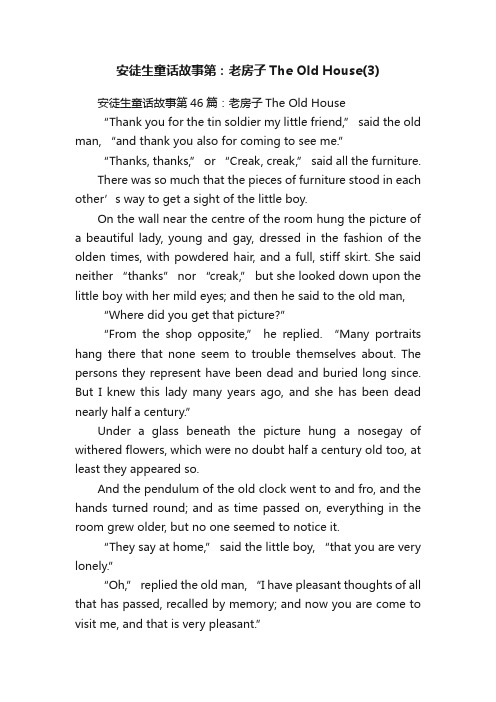
安徒生童话故事第:老房子The Old House(3)安徒生童话故事第46篇:老房子The Old House“Thank you for the tin soldier my little friend,” said the old man, “and thank you also for coming to see me.”“Thanks, thanks,” or “Creak, creak,” said all the furniture.There was so much that the pieces of furniture stood in each other’s way to get a sight of the little boy.On the wall near the centre of the room hung the picture of a beautiful lady, young and gay, dressed in the fashion of the olden times, with powdered hair, and a full, stiff skirt. She said neither “thanks” nor “creak,” but she looked down upon the little boy with her mild eyes; and then he said to the old man, “Where did you get that picture?”“From the shop opposite,” he replied. “Many portraits hang there that none seem to trouble themselves about. The persons they represent have been dead and buried long since. But I knew this lady many years ago, and she has been dead nearly half a century.”Under a glass beneath the picture hung a nosegay of withered flowers, which were no doubt half a century old too, at least they appeared so.And the pendulum of the old clock went to and fro, and the hands turned round; and as time passed on, everything in the room grew older, but no one seemed to notice it.“They say at home,” said the little boy, “that you are very lonely.”“Oh,” replied the old man, “I have pleasant thoughts of all that has passed, recalled by memory; and now you are come to visit me, and that is very pleasant.”Then he took from the book-case, a book full of pictures representing long processions of wonderful coaches, such as are never seen at the present time. Soldiers like the knave of clubs, and citizens with waving banners. The tailors had a flag with a pair of scissors supported by two lions, and on the shoemakers’ flag there were not boots, but an eagle with two heads, for the shoemakers must have everything arranged so that they can say, “This is a pair.” What a picture-book it was; and then the old man went into another room to fetch apples and nuts. It was very pleasant, certainly, to be in that old house.“I cannot endure it,” said the tin soldier, who stood on a shelf, “it is so lonely and dull here. I have been accustomed to live in a family, and I cannot get used to this life. I cannot bear it. The whole day is long enough, but the evening is longer. It is not here like it was in your house opposite, when your father and mother talked so cheerfully together, while you and all the dear children made such a delightful noise. No, it is all lonely in the old man’s house. Do you think he gets any kisses? Do you think he ever has friendly looks, or a Christmas tree? He will have nothing now but the grave. Oh, I cannot bear it.”“You must not look only on the sorrowful side,” said the little boy; “I think everything in this house is beautiful, and all the old pleasant thoughts come back here to pay visits.”“Ah, but I never see any, and I don’t know them,” said the tin soldier, “and I cannot bear it.”“You must bear it,” said the little boy. Then the old man came back with a pleasant face; and brought with him beautiful preserved fruits, as well as apples and nuts; and the little boy thought no more of the tin soldier. How happy and delighted the little boy was; and after he returned home, and while days andweeks passed, a great deal of nodding took place from one house to the other, and then the little boy went to pay another visit. The carved trumpeters blew “Tanta-ra-ra. There is the little boy. Tanta-ra-ra.” The swords and armor on the old knight’s pictures rattled. The silk dresses rustled, the leather repeated its rhyme, and the old chairs had the gout in their backs, and cried, “Creak;” it was all exactly like the first time; for in that ho use, one day and one hour were just like another. “I cannot bear it any longer,” said the tin soldier; “I have wept tears of tin, it is so melancholy here. Let me go to the wars, and lose an arm or a leg, that would be some change; I cannot bear it. Now I know what it is to have visits from one’s old recollections, and all they bring with them. I have had visits from mine, and you may believe me it is not altogether pleasant. I was very nearly jumping from the shelf. I saw you all in your house opposite, as if you were really present. It was Sunday morning, and you children stood round the table, singing the hymn that you sing every morning. You were standing quietly, with your hands folded, and your father and mother. You were standing quietly, with your hands folded, and your father and mother were looking just as serious, when the door opened, and your little sister Maria, who is not two years old, was brought into the room. You know she always dances when she hears music and singing of any sort; so she began to dance immediately, although she ought not to have done so, but she could not get into the right time because the tune was so slow; so she stood first on one leg and then on the other, and bent her head very low, but it would not suit the music. You all stood looking very grave, although it was very difficult to do so, but I laughed so to myself that I fell down from the table, and got a bruise, which is there still; I know it was not right to laugh. Soall this, and everything else that I have seen, keeps running in my head, and these must be the old recollections that bring so many thoughts with them. Tell me whether you still sing on Sundays, and tell me about your little sister Maria, and how my old comrade is, the other tin soldier. Ah, really he must be very happy;I cannot endure this life.”“You are given away,” said the little boy; “you must stay. Don’t you see that?” Then the old man came in, with a box containing many curious things to show him. Rouge-pots, scent-boxes, and old cards, so large and so richly gilded, that none are ever seen like them in these days. And there were smaller boxes to look at, and the piano was opened, and inside the lid were painted landscapes. But when the old man played, the piano sounded quite out of tune. Then he looked at the picture he had bought at the broker’s, and his eyes sparkled brightly as he nodded at it, and said, “Ah, she could sing that tune.”“I will go to the wars! I will go to the wars!” cried the tin soldier as loud as he could, and threw himself down on the floor. Where could he have fallen? The old man searched, and the little boy searched, but he was gone, and could not be found. “I shall find him again,” said the old man, but he did not find him. The boards of the floor were open and full of holes. The tin soldier had fallen through a crack between the boards, and lay there now in an open grave. The day went by, and the little boy returned home; the week passed, and many more weeks. It was winter, and the windows were quite frozen, so the little boy was obliged to breathe on the panes, and rub a hole to peep through at the old house. Snow drifts were lying in all the scrolls and on the inscriptions, and the steps were covered with snow as if no one were at home. And indeed nobody was home, for the old manwas dead. In the evening, a hearse stopped at the door, and the old man in his coffin was placed in it. He was to be taken to the country to be buried there in his own grave; so they carried him away; no one followed him, for all his friends were dead; and the little boy kissed his hand to the coffin as the hearse moved away with it. A few days after, there was an auction at the old house, and from his window the little boy saw the people carrying away the pictures of old knights and ladies, the flower-pots with the long ears, the old chairs, and the cup-boards. Some were taken one way, some another. Her portrait, which had been bought at the picture dealer’s, went back again to his shop, and there it remained, for no one seemed to know her, or to care for the old picture. In the spring; they began to pull the house itself down; people called it complete rubbish. From the street could be seen the room in which the walls were covered with leather, ragged and torn, and the green in the balcony hung straggling over the beams; they pulled it down quickly, for it looked ready to fall, and at last it was cleared away altogether. “What a good riddance,” said the neighbors’ houses. Very shortly, a fine new house was built farther back from the road; it had lofty windows and smooth walls, but in front, on the spot where the old house really stood, a little garden was planted, and wild vines grew up over the neighboring walls; in front of the garden were large iron railings and a great gate, which looked very stately. People used to stop and peep through the railings. The sparrows assembled in dozens upon the wild vines, and chattered all together as loud as they could, but not about the old house; none of them could remember it, for many years had passed by, so many indeed, that the little boy was now a man, and a really good man too, and his parents were very proud of him. He was just married, and hadcome, with his young wife, to reside in the new house with the garden in front of it, and now he stood there by her side while she planted a field flower that she thought very pretty. She was planting it herself with her little hands, and pressing down the earth with her fingers. “Oh dear, what was that?” she exclaimed, as something pricked her. Out of the soft earth something was sticking up. It was—only think!—it was really the tin soldier, the very same which had been lost up in the old man’s room, and had been hidden among old wood and rubbish for a long time, till it sunk into the earth, where it must have been for many years. And the young wife wiped the soldier, first with a green leaf, and then with her fine pocket-handkerchief, that smelt of such beautiful perfume. And the tin soldier felt as if he was recovering from a fainting fit. “Let me see him,” said the young man, and then he smiled and shook his head, and said, “It can scarcely be the same, but it reminds me of something that happened to one of my tin soldiers when I was a little boy.” And then he told his wife about the old house and the old man, and of the tin soldier which he had sent across, because he thought the old man was lonely; and he related the story so clearly that tears came into the eyes of the young wife for the old house and the old man. “It is very likely that this is really the same soldier,” said she, and I will take care of him, and always remember what you have told me; but some day you must show me the old man’s grave.”“I don’t know where it is,” he replied; “no one knows. All his friends are dead; no one took care of him, and I was only a little boy.”“Oh, how dreadfully lonely he must have been,” said she.“Yes, terribly lonely,” cried the tin soldier; “still it is delightful not to be forgotten.”“Delightful indeed,” cried a voice quite near to them; no one but the tin soldier saw that it came from a rag of the leather which hung in tatters; it had lost all its gilding, and looked like wet earth, but it had an opinion, and it spoke it thus:—“Gilding will fade in damp weather,To endure, there is nothing like leather.”But the tin soldier did not believe any such thing.。
童话故事:老房子

童话故事:老房子安徒生,丹麦19世纪著名童话作家,世界文学童话创始人,因为其童话作品而闻名于世。
他通过童话的形式,真实地反映了他所处的那个时代及其社会生活,深厚地表达了平凡人的感情和意愿,从而使人们的感情得到净化与升华。
下面店铺为大家带来安徒生英语童话故事:老房子,欢迎大家阅读!In the street, up there, was an old, a very old house--it was almost threehundred years old, for that might be known by reading the great beam on whichthe date of the year was carved: together with tulips and hop-binds there werewhole verses spelled as in former times, and over every window was a distortedface cut out in the beam. The one story stood forward a great way over theother; and directly under the eaves was a leaden spout with a dragon's head;the rain-water should have run out of the mouth, but it ran out of the belly,for there was a hole in the spout.All the other houses in the street were so new and so neat, with large windowpanes and smooth walls, one could easily see that they would have nothing todo with the old house: they certainly thought, "How long is that old decayedthing to stand here as a spectacle in the street? And then the projectingwindows stand so far out, that no one can see from our windows what happens inthat direction! The steps are as broad as those of a palace, and as high as toa church tower. The iron railings look just like the door to an old familyvault, and then they have brass tops--that's so stupid!"On the other side of the street were also new and neat houses, and theythought just as the others did; but at the window opposite the old house theresat a little boy with fresh rosy cheeks and bright beaming eyes: he certainlyliked the old house best, and that both in sunshine and moonshine. And when helooked across at the wall where the mortar had fallen out, he could sit andfind out there the strangest figures imaginable; exactly as the street hadappeared before, with steps, projecting windows, and pointed gables; he couldsee soldiers with halberds, and spouts where the water ran, like dragons andserpents. That was a house to look at; and there lived an old man, who woreplush breeches; and he had a coat with large brass buttons, and a wig that onecould see was a real wig. Every morning there came an old fellow to him whoput his rooms in order, and went on errands; otherwise, theold man in theplush breeches was quite alone in the old house. Now and then he came to thewindow and looked out, and the little boy nodded to him, and the old mannodded again, and so they became acquaintances, and then they were friends,although they had never spoken to each other--but that made no difference. Thelittle boy heard his parents say, "The old man opposite is very well off, buthe is so very, very lonely!"The Sunday following, the little boy took something, and wrapped it up in apiece of paper, went downstairs, and stood in the doorway; and when the manwho went on errands came past, he said to him--"I say, master! will you give this to the old man over the way from me? I havetwo pewter soldiers--this is one of them, and he shall have it, for I know heis so very, very lonely."And the old errand man looked quite pleased, nodded, and took the pewtersoldier over to the old house. Afterwards there came a message; it was to askif the little boy himself had not a wish to come over and pay a visit; and sohe got permission of his parents, and then went over to the old house.And the brass balls on the iron railings shone much brighter than ever; onewould have thought they were polished on account of the visit; and it was asif the carved-out trumpeters--for there were trumpeters, who stood in tulips,carved out on the door--blew with all their might, their cheeks appeared somuch rounder than before. Yes, they blew--"Trateratra! The little boy comes!Trateratra!"--and then the door opened.The whole passage was hung with portraits of knights in armor, and ladies insilken gowns; and the armor rattled, and the silken gowns rustled! And thenthere was a flight of stairs which went a good way upwards, and a little waydownwards, and then one came on a balcony which was in a very dilapidatedstate, sure enough, with large holes and long crevices, but grass grew thereand leaves out of them altogether, for the whole balcony outside, the yard,and the walls, were overgrown with so much green stuff, that it looked like agarden; only a balcony. Here stood old flower-pots with faces and asses' ears,and the flowers grew just as they liked. One of the pots was quite overrun onall sides with pinks, that is to say, with the green part; shootstood byshoot, and it said quite distinctly, "The air has cherished me, the sun haskissed me, and promised me a little flower on Sunday! a little flower onSunday!"And then they entered a chamber where the walls were covered with hog'sleather, and printed with gold flowers."The gilding decays,But hog's leather stays!"said the walls.And there stood easy-chairs, with such high backs, and so carved out, and witharms on both sides. "Sit down! sit down!" said they. "Ugh! how I creak; now Ishall certainly get the gout, like the old clothespress, ugh!"And then the little boy came into the room where the projecting windows were,and where the old man sat."I thank you for the pewter soldier, my little friend!" said the old man. "AndI thank you because you come over to me.""Thankee! thankee!" or "cranky! cranky!" sounded from all the furniture; therewas so much of it, that each article stood in the other's way, to get a lookat the little boy.In the middle of the wall hung a picture representing a beautiful lady, soyoung, so glad, but dressed quite as in former times, with clothes that stoodquite stiff, and with powder in her hair; she neither said "thankee, thankee!"nor "cranky, cranky!" but looked with her mild eyes at the little boy, whodirectly asked the old man, "Where did you get her?""Yonder, at the broker's," said the old man, "where there are so many pictureshanging. No one knows or cares about them, for they are all of them buried;but I knew her in by-gone days, and now she has been dead and gone these fiftyyears!"Under the picture, in a glazed frame, there hung a bouquet of witheredflowers; they were almost fifty years old; they looked so very old!The pendulum of the great clock went to and fro, and the hands turned, andeverything in the room became still older; but they did not observe it."They say at home," said the little boy, "that you are so very, very lonely!""Oh!" said he. "The old thoughts, with what they may bring with them, come andvisit me, and now you also come! I am very well off!"Then he took a book with pictures in it down from the shelf; there werewhole long processions and pageants, with the strangestcharacters, which onenever sees now-a-days; soldiers like the knave of clubs, and citizens withwaving flags: the tailors had theirs, with a pair of shears held by twolions--and the shoemakers theirs, without boots, but with an eagle that hadtwo heads, for the shoemakers must have everything so that they can say, it isa pair! Yes, that was a picture book!The old man now went into the other room to fetch preserves, apples, andnuts--yes, it was delightful over there in the old house."I cannot bear it any longer!" said the pewter soldier, who sat on thedrawers. "It is so lonely and melancholy here! But when one has been in afamily circle one cannot accustom oneself to this life! I cannot bear it anylonger! The whole day is so long, and the evenings are still longer! Here itis not at all as it is over the way at your home, where your father andmother spoke so pleasantly, and where you and all your sweet children madesuch a delightful noise. Nay, how lonely the old man is--do you think that hegets kisses? Do you think he gets mild eyes, or a Christmas tree? He will getnothing but a grave! I can bear it no longer!""You must not let it grieve you so much," said the little boy. "I find it sovery delightful here, and then all the old thoughts, with what they may bringwith them, they come and visit here.""Yes, it's all very well, but I see nothing of them, and I don't know them!"said the pewter soldier. "I cannot bear it!""But you must!" said the little boy.Then in came the old man with the most pleased and happy face, the mostdelicious preserves, apples, and nuts, and so the little boy thought no moreabout the pewter soldier.The little boy returned home happy and pleased, and weeks and days passedaway, and nods were made to the old house, and from the old house, and thenthe little boy went over there again.The carved trumpeters blew, "Trateratra! There is the little boy! Trateratra!"and the swords and armor on the knights' portraits rattled, and the silk gownsrustled; the hog's leather spoke, and the old chairs had the gout in theirlegs and rheumatism in their backs: Ugh! it was exactly like the first time,for over there one day and hour was just like another."I cannot bear it!" said the pewter soldier. "I have shed pewter tears! It istoo melancholy! Rather let me go to the wars and lose arms and legs! It wouldat least be a change. I cannot bear it longer! Now, I know what it is to havea visit from one's old thoughts, with what they may bring with them! I havehad a visit from mine, and you may be sure it is no pleasant thing in the end;I was at last about to jump down from the drawers."I saw you all over there at home so distinctly, as if you really were here;it was again that Sunday morning; all you children stood before the table andsung your Psalms, as you do every morning. You stood devoutly with foldedhands; and father and mother were just as pious; and then the door was opened,and little sister Mary, who is not two years old yet, and who always danceswhen she hears music or singing, of whatever kind it may be, was put into theroom--though she ought not to have been there--and then she began to dance,but could not keep time, because the tones were so long; and then she stood,first on the one leg, and bent her head forwards, and then on the other leg,and bent her head forwards--but all would not do. You stood very seriously alltogether, although it was difficult enough; but I laughed tomyself, and thenI fell off the table, and got a bump, which I have still--for it was notright of me to laugh. But the whole now passes before me again in thought, andeverything that I have lived to see; and these are the old thoughts, with whatthey may bring with them."Tell me if you still sing on Sundays? T ell me something about little Mary!And how my comrade, the other pewter soldier, lives! Yes, he is happy enough,that's sure! I cannot bear it any longer!""You are given away as a present!" said the little boy. "You must remain. Canyou not understand that?"The old man now came with a drawer, in which there was much to be seen, both"tin boxes" and "balsam boxes," old cards, so large and so gilded, such as onenever sees them now. And several drawers were opened, and the piano wasopened; it had landscapes on the inside of the lid, and it was so hoarse whenthe old man played on it! and then he hummed a song."Yes, she could sing that!" said he, and nodded to the portrait, which hehad bought at the broker's, and the old man's eyes shone so bright!"I will go to the wars! I will go to the wars!" shouted thepewter soldier asloud as he could, and threw himself off the drawers right down on the floor.What became of him? The old man sought, and the little boy sought; he wasaway, and he stayed away."I shall find him!" said the old man; but he never found him. The floor wastoo open--the pewter soldier had fallen through a crevice, and there he lay asin an open tomb.That day passed, and the little boy went home, and that week passed, andseveral weeks too. The windows were quite frozen, the little boy was obligedto sit and breathe on them to get a peep-hole over to the old house, and therethe snow had been blown into all the carved work and inscriptions; it layquite up over the steps, just as if there was no one at home--nor was thereany one at home--the old man was dead!In the evening there was a hearse seen before the door, and he was borne intoit in his coffin: he was now to go out into the country, to lie in his grave.He was driven out there, but no one followed; all his friends were dead, andthe little boy kissed his hand to the coffin as it was driven away.Some days afterwards there was an auction at the old house, and the little boysaw from his window how they carried the old knights and the old ladies away,the flower-pots with the long ears, the old chairs, and the old clothes-presses. Something came here, and something came there; the portraitof her who had been found at the broker's came to the broker's again; andthere it hung, for no one knew her more--no one cared about the old picture.In the spring they pulled the house down, for, as people said, it was a ruin.One could see from the street right into the room with the hog's-leatherhanging, which was slashed and torn; and the green grass and leaves about thebalcony hung quite wild about the falling beams. And then it was put torights."That was a relief," said the neighboring houses.A fine house was built there, with large windows, and smooth white walls; butbefore it, where the old house had in fact stood, was a little garden laidout, and a wild grapevine ran up the wall of the neighboring house. Before thegarden there was a large iron railing with an iron door, it looked quitesplendid, and people stood still and peeped in, and thesparrows hung byscores in the vine, and chattered away at each other as well as they could,but it was not about the old house, for they could not remember it, so manyyears had passed--so many that the little boy had grown up to a whole man,yes, a clever man, and a pleasure to his parents; and he had just beenmarried, and, together with his little wife, had come to live in the househere, where the garden was; and he stood by her there whilst she planted afield-flower that she found so pretty; she planted it with her little hand,and pressed the earth around it with her fingers. Oh! what was that? She hadstuck herself. There sat something pointed, straight out of the soft mould.It was--yes, guess! It was the pewter soldier, he that was lost up at the oldman's, and had tumbled and turned about amongst the timber and the rubbish,and had at last laid for many years in the ground.The young wife wiped the dirt off the soldier, first with a green leaf, andthen with her fine handkerchief--it had such a delightful smell, that it wasto the pewter soldier just as if he had awaked from a trance."Let me see him," said the young man. He laughed, and thenshook his head."Nay, it cannot be he; but he reminds me of a story about a pewter soldierwhich I had when I was a little boy!" And then he told his wife about the oldhouse, and the old man, and about the pewter soldier that he sent over to himbecause he was so very, very lonely; and he told it as correctly as it hadreally been, so that the tears came into the eyes of his young wife, onaccount of the old house and the old man."It may possibly be, however, that it is the same pewter soldier!" said she."I will take care of it, and remember all that you have told me; but you mustshow me the old man's grave!""But I do not know it," said he, "and no one knows it! All his friends weredead, no one took care of it, and I was then a little boy!""How very, very lonely he must have been!" said she."Very, very lonely!" said the pewter soldier. "But it is delightful not to beforgotten!""Delightful!" shouted something close by; but no one, except the pewtersoldier, saw that it was a piece of the hog's-leather hangings; it had lostall its gilding, it looked like a piece of wet clay, but it had an opinion,and it gave it:"The gilding decays,But hog's leather stays!"This the pewter soldier did not believe.。
安徒生童话故事:笨汉汉斯

安徒生童话故事:笨汉汉斯引导语:笨汉汉斯的童话故事是安徒生所写,我们一起来学习与阅读。
乡下有一幢古老的房子,里面住着一位年老的乡绅。
他有两个儿子。
这两个人是那么聪明,他们只须用一半聪明就够了,还剩下一半是多余的。
他们想去向国王的女儿求婚,而也敢于这样做,因为她宣布过,说她要找一个她认为最能表现自己的人做丈夫。
“我要得到这位公主!”他们两人齐声说。
于是他们的父亲就给他们两人每人一匹漂亮的马。
那个能背诵整部字典和三年报纸的兄弟得到一匹漆黑的马;那个懂得公司法和会绣花的兄弟得到一匹乳白色的马。
然后他们就在自己的嘴角上抹了一些鱼肝油,以便能够说话圆滑流利。
所有的仆人们都站在院子里,观看他们上马。
这时忽然第三位少爷来了,因为他们兄弟有三个人,虽然谁也不把他当做一个兄弟——因为他不像其他两个那样有学问。
一般人都把他叫做“笨汉汉斯”。
“你们穿得这么漂亮,要到什么地方去呀?”他问。
“到宫里去,向国王的女儿求婚去!你不知道全国各地都贴了布告了吗?”于是他们就把事情原原本本地都告诉了他。
“我的天!我也应该去!”笨汉汉斯说。
他的两个兄弟对他大笑了一通以后,便骑着马儿走了。
“爸爸,我也得有一匹马。
”笨汉汉斯大声说。
“我现在非常想结婚!如果她要我,她就可以得到我。
她不要我,我还是要她的!”“这完全是胡说八道!”父亲说。
“我什么马也不给你。
你连话都不会讲!你的两个兄弟才算得是聪明人呢!”“如果我不配有一匹马,”笨汉汉斯说,“那么就给我一只公山羊吧,它本来就是我的,它驮得起我!”因此他就骑上了公山羊。
他把两腿一夹,就在公路上跑起来了。
“嗨,嗬!骑得真够劲!我来了!”笨汉汉斯说,同时唱起歌来,他的声音引起一片回音。
但是他的两个哥哥在他前面却骑得非常斯文,他们一句话也不说,他们正在考虑如何讲出那些美丽的词句,因为这些东西都非在事先想好不可。
“喂!”笨汉汉斯喊着。
“我来了!瞧瞧我在路上拾到的东西吧!”于是他就把他抬到的一只死乌鸦拿给他们看。
- 1、下载文档前请自行甄别文档内容的完整性,平台不提供额外的编辑、内容补充、找答案等附加服务。
- 2、"仅部分预览"的文档,不可在线预览部分如存在完整性等问题,可反馈申请退款(可完整预览的文档不适用该条件!)。
- 3、如文档侵犯您的权益,请联系客服反馈,我们会尽快为您处理(人工客服工作时间:9:00-18:30)。
安徒生童话故事精选:老房子街上有一幢很老很老的房子,它几乎有三百年的历史,这个点,人们在它的大梁上就能够看得出来;那上面刻着郁金香和牵藤的啤酒花花纹——在这中间刻着的是它兴建的年月。
在那上面人们还能够看到整首用古老的字体刻出来的诗篇。
在每个窗子上的桁条上还刻着做出讥笑样子的脸谱。
第二层楼比第一层楼向外突出很多;屋檐下有一个刻着龙头的铅水笕。
雨水本来应该是从龙的嘴里流出来的,但它却从它的肚皮中冒出来了,因为水笕有一个洞。
街上所有的别的房子都是很新、很整齐的;它们的墙很光,窗玻璃很宽,人们能够看得出,它们不愿意跟这座老房子有什么来往。
它们无疑地在想:“那个老垃圾堆作为街上的一个笑柄还能站得住多久呢?它的吊窗凸出墙外太远,谁也不能从我们的窗子这边看到那边所发生的事情。
它的楼梯宽得像宫殿里的楼梯,高得像是要通到一个教堂的塔里面去。
它的铁栏杆像一个家庭墓窖的门——上面还装置着黄铜小球。
这真可笑!”它的对面也是整齐的新房子。
它们也有同样的看法。
不过这儿有一个孩子坐在窗子里面。
他有一副红润的面孔和一对闪耀的眼睛。
他特别喜欢这幢老房子,不论在太阳光里或在月光里都是这样。
他看到那些泥灰全都脱落了的墙壁,就坐着幻想出很多奇怪的图景来——这条街、那些楼梯、吊窗和尖尖的山形墙,在古时会像一个什么样子呢?他能够看到拿着戟的兵士,以及形状像龙和鲛的水笕。
这的确是一幢值得一看的房子!那里面住着一个老人。
他穿着一条天鹅绒的马裤,一件有大黄铜扣子的上衣;他还戴着一副假发①——人们一眼就能够看出这是真正的假发。
每天早晨有一个老仆人来为他打扫房间和跑腿。
除此以外,这座老房子里就只孤独地住着这位穿天鹅绒马裤的老人了。
他偶尔来到窗子跟前,朝外面望一眼。
这时这个小孩就对他点点头,作为回答。
他们就这样相互理解了,而且成了朋友,虽然他们从来没有讲过一句话。
不过事实上也没有这个必要。
小孩以前听到他的父母说过:“对面的那个老人很富有,不过他是非常孤独的!”①古时欧洲的绅士和富有的人常常戴着假发,以掩住秃顶,同时也借此显得尊严一些。
在下一个星期天,这孩子用一张纸包了一点东西,走到门口。
当那个为这老人跑腿的仆人走过时,他就对他说:“请听着!你能不能把这东西带给对面的那个老人呢?我有两个锡兵①。
这是其中的一个;我要送给他,因为我知道他是非常孤独的。
”①锡兵,这里是指用镀锡铁皮做成的玩具兵。
老仆人表示出高兴的样子。
他点了点头,于是就把锡兵带到老房子里去了。
不久他就来问小孩,愿意不愿意亲自去拜访一次。
他的爸爸妈妈准许他去。
所以他就去拜访那个老房子了。
台阶栏杆上的那些铜球比平时要光亮得多;人们很可能以为这是专门为了他的拜访而擦亮的。
那些雕刻出来的号手——因为门上都刻着号手,他们立在郁金香花里——都在使劲地吹喇叭;他们的双颊比以前要圆得多。
是的,他们在吹:“嗒—嗒—啦—啦!小朋友到来了!嗒—嗒—啦—啦!”于是门便开了。
整个走廊里挂满了古老的画像:穿着铠甲的骑士和穿着丝绸的女子。
铠甲发出响声,绸衣在窸窸窣窣地颤动。
接着就是一个楼梯。
它高高地伸向上面去,然后就略微弯下一点。
这时他就来到一个阳台上。
它的确快要坍塌了。
处处是长长的裂痕和大洞,不过它们里面却长出了很多草和叶子。
因为阳台、院子和墙都长满了那么多的绿色植物,所以它们整个看起来像一个花园。
但这还不过是一个阳台。
这儿有些古旧的花盆;它们都有一个面孔和驴耳朵。
花儿自由自在地随处乱长。
有一个花盆全被石竹花铺满了,这也就是说:长满了绿叶子,冒出了很多嫩芽——它们在很清楚地说:“空气抚爱着我,太阳吻着我,同时答应让我在下星期日开出一朵小花——下星期日开出一朵小花啦!”于是他走进一个房间。
这儿的墙上全都糊满了猪皮;猪皮上印着金花。
墙儿说:镀金消失得很快,但猪皮永远不坏!沿墙摆着很多高背靠椅;每张椅子都刻着花,而且还有扶手。
“请坐吧!请坐吧!”它们说。
“啊,我的身体真要裂开了!像那个老碗柜一样,我想我一定得了痛风病!我背上得了痛风病,噢!”不一会儿孩子走进一个客厅,那个吊窗就在这儿,那个老人也在这儿。
“亲爱的小朋友,多谢你送给我的锡兵!”老人说,“多谢你来看我!”“谢谢!谢谢!”——也能够说是——“嘎!啪!”这是所有的家具讲的话。
它们的数目很多,当它们都来看这孩子的时候,它们几乎挤做一团。
墙中央挂着一个美丽女子的画像。
她的样子很年轻和快乐,但是却穿着古时的衣服;她的头发和挺直的衣服都扑满了粉。
她既不说“谢谢”,也不说“啪”;她仅仅用温和的眼睛望着这个小孩子。
他当时就问这老人:“您从什么地方弄到这张像的?”“从对面的那个旧货商人那里!”老人说。
“那儿挂着很多画像。
谁也不理解他们,也不愿意去管他们,因为他们早就被埋葬掉了。
不过从前我理解这个女子,现在她已经死了,而且死了半个世纪啦。
”在这幅画下边,在玻璃的后面,挂着一个枯萎了的花束。
它们无疑也有半个世纪的历史,因为它们的样子也很古老。
那个大钟的摆摇来摇去;钟上的针在转动。
这房间里每件东西在时时刻刻地变老,但是人们却不觉得。
小孩子说:“家里的人说,你一直是非常孤独的!”“哎,”老人说,“旧时的回忆以及与回忆相联的事情,都来拜访,现在你也来拜访了!我感到非常快乐!”于是他从书架上取出一本画册:那里面有很多我们现在见不到的华丽的马车行列,很多打扮得像纸牌上的“贾克”的兵士和挥着旗子的市民。
裁缝挥着的旗帜上绘着一把由两只狮子抬着的大剪刀;鞋匠挥着的旗子上绘有一只双头鹰——不是靴子,因为鞋匠必须把一切东西安排得使人一看就说:“那是一双。
”是的,就是这样的一本画册!老人走到另外一个房间里去拿出一些蜜饯、苹果和硬壳果来——这个老房子里的一切东西真是可爱。
“我再也忍受不了!”立在五斗柜上的那个锡兵说。
“这儿是那么寂寞,那么悲哀。
一个惯于过家庭生活的人,在这儿实在住不下去!我再也忍受不了!日子已经够长了,而晚间却是更长!这儿的情形跟他们那儿的情形完全不一样。
你的爸爸和妈妈总是愉快地在一起聊天,你和别的一些可爱的孩子也发出高兴的闹声。
嗨!这个老人,他是多么寂寞啊!你以为他会得到什么吻么?你以为会有人温和地看他一眼么?或者他会有一棵圣诞树么?他什么也没有,只有等死!我再也忍受不了!”“你不能老是从悲哀的角度去看事情呀!”小孩子说,“我觉得这儿什么东西都可爱!而且旧时的回忆以及与回忆相联的事情都到这儿来拜访!”“是的,但是我看不见它们,也不理解它们!”锡兵说,“我再也忍受不了!”“你要忍受下去。
”小孩子说。
这时老人带着一副最愉快的面孔和最甜美的蜜饯、苹果以及硬壳果走来了。
小孩子便不再想起锡兵了。
这个小年轻人,怀着幸福和高兴的心情,回到家来。
很多日子、很多星期过去了。
和对面那个老房子,又有很多往返不停的点头。
最后小孩子又走过去拜访了。
那些雕刻的号手又吹起:“嗒—啦—啦,嗒—啦—啦!小朋友又来了!嗒—啦—啦!”接着那些骑士身上的剑和铠甲又响起来了,那些绸衣服又沙沙地动起来了。
那些猪皮又讲起话来了,那些老椅子的背上又有痛风病了。
噢!这跟头一次来的时候完全一样,因为在这儿,这个天,这个点钟完全跟另一天,另一点钟是一样。
“我再也忍受不了!”锡兵说。
“我已经哭出了锡眼泪!这儿是太悲哀了!我宁愿上战场,牺牲掉我的手和脚——这种生活总算还有点变化。
我再也忍受不了!现在我才懂得,回忆以及与回忆相联的事情来拜访是一种什么味道!我的回忆也来拜访了。
请相信我,结果并不是太愉快。
我几乎要从五斗柜上跳下来了。
你们在对面房子里面的情形,我看得清清楚楚,好像你们就在这儿一样。
又是一个礼拜天的早晨——你们都很熟悉的一天!你们孩子们围着桌子站着,唱你们每天早晨唱的圣诗。
你们把手合在一起,庄严地站着;爸爸和妈妈也是同样地庄严。
于是门开了,小妹妹玛利亚被领进来了——她还不到两岁;无论什么时候,只要她听到音乐或歌声,而且不管什么音乐或歌声,她就跳起舞来。
她还不大会跳,但是她却要马上跳起来,虽然她跳得不合拍子,因为拍子是太长了。
她先用一只腿站着,把头向前弯,然后又用另一只腿站着,又把头向前弯,不过这次却弯得不好。
你们都站着不做一声,虽然这是很困难的。
但是我在心里却笑起来了,所以我就从桌上滚下来了,而且还跌出一个包来——这个包现在还在——因为我笑是不对的。
但是这个切,以及我所经历过的很多事情,现在又来到我的心里——这个定就是回忆以及与回忆相联的事情了。
请告诉我,你们仍然在礼拜天唱歌吗?请告诉我一点关于小玛利亚的消息好吗?我的老朋友——那另一个锡兵——现在怎样了?是的,他一定是很快乐的!——我却是再也忍受不了!”“你已经被送给别人了!”小孩子说。
“你应该安心下来。
这个点你还看不出来吗?”这时那个老人拿着一个抽屉走进来。
抽屉里有很多东西可看:粉盒、香膏盒、旧扑克牌——它们都很大,还镀着金,现在我们是看不到这样的东西的。
他还打开了很多抽屉,拉开了一架钢琴,钢琴盖上绘着风景画。
当这老人弹着的时候,钢琴就发出粗哑的声音。
于是他就哼出一支歌来。
“是的,她也能唱这支歌!”他说。
于是他就对这幅从旧货商人那儿买来的画点点头。
老人的眼睛变得明亮起来了。
“我要到战场上去!我要到战场上去!”锡兵尽量提升嗓子大叫;接着他就栽到地上去了。
是的,他到什么地方去了呢?老人在找,小孩也在找,但是他不见了,他失踪了。
“我会找到他的!”老人说。
不过他永远也没有找到他,因为地板上有很多洞和裂口。
锡兵滚到一个裂口里去了。
他躺在那里,好像躺在一个没有盖土的坟墓里一样。
这个天过去了。
小孩子回到家里。
一星期又过去了,接着又有很多星期过去了。
窗子上都结了冰,小孩子得坐下来,在窗玻璃上用嘴哈气融出一个小视孔来看看那座老房子。
雪花飘进那些刻花和刻字中间去,把整个台阶都盖住了,好像这座老房子里没有住着什么人似的。
的确,这里现在没有人,因为那个老人已经死了!黄昏的时候,门外停着一辆马车。
人们把他放进棺材,抬上马车。
他不久就要给埋进他乡下的坟墓里,他现在就要被运到那儿去,不过没有人来送葬,因为他所有的朋友都已经死了。
当棺材被运走的时候,小孩子在后面用手对他飞吻。
几天以后,这座老房子里举行一次拍卖。
小孩子从他的窗子里看到那些古老的骑士和女子、那些有长耳朵的花盆、那些古旧的椅子和碗柜,统统都被人搬走了。
有的搬到这儿去,有的搬到那儿去。
她的画像——在那个旧货商店里找来的——仍然回到那个旧货商店里去了,而且一直挂在那里,因为谁也不理解她,谁也不愿意要一张老画。
到了春天,这座房子就被拆掉了,因为人们说它是一堆烂垃圾。
人们能够从街上一眼就看到墙上贴着猪皮的那个房间。
这些皮已经被拉下来了,并且被撕碎了。
阳台上那些绿色植物凌乱地在倒下的屋梁间悬着。
现在人们要把这块地方扫清。
“这才好啦!”周围的房子说。
一幢漂亮的新房子建立起来了;它有宽大的窗子和平整的白墙。
不过那座老房子原来所在的地方恰恰成了一个小花园。
